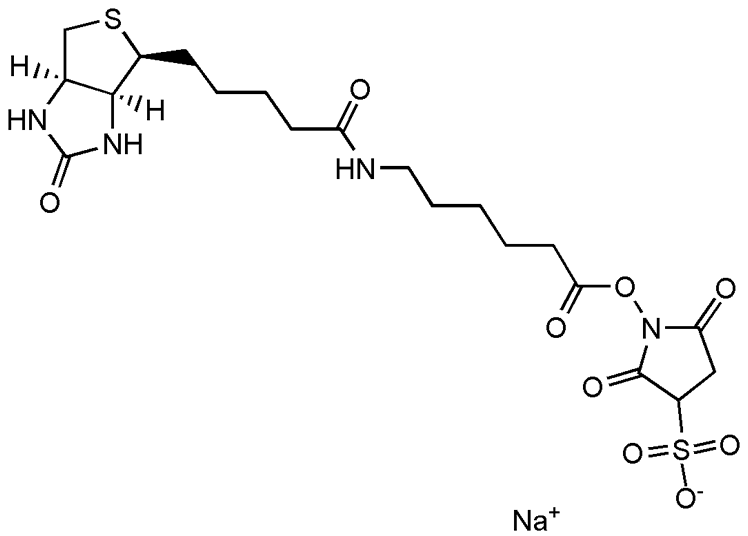Biotinamidohexanoic acid 3-sulfo-N-hydroxysuccinimide ester sodium salt is widely utilized in research focused on:
- Bioconjugation: This compound is often used to attach biotin to proteins or other biomolecules, enhancing their detection and purification in various assays.
- Diagnostic Applications: In medical diagnostics, it serves as a key component in assays that require high specificity, such as ELISA, improving the accuracy of disease detection.
- Cell Biology: It is employed in cell labeling techniques, allowing researchers to track cellular processes and interactions with greater precision.
- Drug Delivery Systems: The compound can be used to create targeted drug delivery systems, ensuring that therapeutic agents reach specific cells or tissues effectively.
- Research Reagents: It acts as a valuable reagent in various biochemical experiments, providing researchers with reliable results in their studies of protein interactions and functions.
Informations générales
Propriétés
Sécurité et réglementation
Applications
Biotinamidohexanoic acid 3-sulfo-N-hydroxysuccinimide ester sodium salt is widely utilized in research focused on:
- Bioconjugation: This compound is often used to attach biotin to proteins or other biomolecules, enhancing their detection and purification in various assays.
- Diagnostic Applications: In medical diagnostics, it serves as a key component in assays that require high specificity, such as ELISA, improving the accuracy of disease detection.
- Cell Biology: It is employed in cell labeling techniques, allowing researchers to track cellular processes and interactions with greater precision.
- Drug Delivery Systems: The compound can be used to create targeted drug delivery systems, ensuring that therapeutic agents reach specific cells or tissues effectively.
- Research Reagents: It acts as a valuable reagent in various biochemical experiments, providing researchers with reliable results in their studies of protein interactions and functions.
Documents
Fiches de données de sécurité (FDS)
La FDS fournit des informations de sécurité complètes sur la manipulation, le stockage et l’élimination du produit.
Spécifications du produit (PS)
Le PS fournit une description complète des propriétés du produit, notamment sa composition chimique, son état physique, sa pureté et les exigences de stockage. Il détaille également les plages de qualité acceptables et les applications prévues du produit.
Certificats d'analyse (COA)
Recherchez des certificats d'analyse (COA) en saisissant le numéro de lot du produit. Les numéros de lot et de lot se trouvent sur l'étiquette d'un produit, après les mots « Lot » ou « Lot de fabrication ».
Numéro de catalogue
Numéro de lot/série
Certificats d'origine (COO)
Ce certificat d'exploitation confirme le pays dans lequel le produit a été fabriqué, et détaille également les matériaux et composants utilisés et s'il est issu de sources naturelles, synthétiques ou autres sources spécifiques. Ce certificat peut être requis pour les douanes, le commerce et la conformité réglementaire.
Numéro de catalogue
Numéro de lot/série
Fiches de données de sécurité (FDS)
La FDS fournit des informations de sécurité complètes sur la manipulation, le stockage et l’élimination du produit.
DownloadSpécifications du produit (PS)
Le PS fournit une description complète des propriétés du produit, notamment sa composition chimique, son état physique, sa pureté et les exigences de stockage. Il détaille également les plages de qualité acceptables et les applications prévues du produit.
DownloadCertificats d'analyse (COA)
Recherchez des certificats d'analyse (COA) en saisissant le numéro de lot du produit. Les numéros de lot et de lot se trouvent sur l'étiquette d'un produit, après les mots « Lot » ou « Lot de fabrication ».
Numéro de catalogue
Numéro de lot/série
Certificats d'origine (COO)
Ce certificat d'exploitation confirme le pays dans lequel le produit a été fabriqué, et détaille également les matériaux et composants utilisés et s'il est issu de sources naturelles, synthétiques ou autres sources spécifiques. Ce certificat peut être requis pour les douanes, le commerce et la conformité réglementaire.


